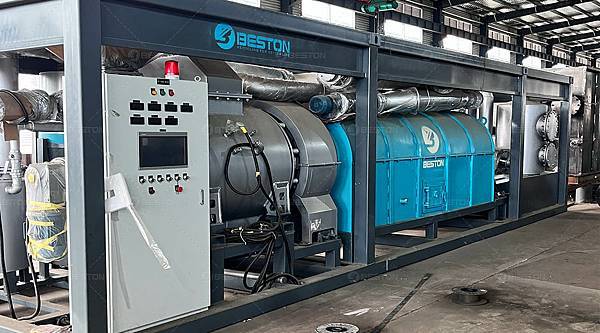As the world continues to grapple with the challenges of climate change, environmental sustainability has become a pressing concern for businesses and individuals alike. One area that has seen significant growth in recent years is coconut shell recycling, particularly in the production of charcoal. But what exactly is coconut charcoal making machine, and how does it work? In this article, we'll explore the ins and outs of this innovative technology and examine its potential benefits for both the environment and local communities.
What is Coconut Charcoal Making Machine?
Coconut charcoal making machine is a piece of equipment designed to convert coconut shells into activated carbon, also known as charcoal. The process involves heating the coconut shells in a low-oxygen environment to produce a porous, lightweight material that can be used in various applications, including water filtration, soil amendment, and even cosmetics. The machine itself consists of several components, including a feeding system, a pyrolysis chamber, a cooling system, and a final product collection system. The feeding system ensures that the coconut shells are fed into the pyrolysis chamber at a consistent rate, where they are heated to high temperatures in the absence of oxygen. This process produces a mixture of gases, including methane, ethanol, and acetylene, which are then collected and stored for later use. The resulting charcoal is then cooled and collected, ready to be packaged and sold to customers. The entire process is automated, requiring minimal human intervention and reducing the risk of contamination.
How Does Coconut Charcoal Making Machine Work?
So, how does the machine actually work? The process begins with the collection of coconut shells, which are first cleaned and shredded into smaller pieces to increase their surface area. These pieces are then fed into the pyrolysis chamber, where they are subjected to high temperatures (typically between 200°C to 800°C) in the absence of oxygen. This process causes the coconut shells to undergo thermal degradation, releasing volatile gases and leaving behind a porous, lightweight material – activated carbon. The activation process increases the surface area of the carbon, allowing it to absorb impurities and contaminants more effectively. The pyrolysis process also produces a range of byproducts, including bio oil, which can be used as a renewable energy source. The machine's design ensures that these byproducts are captured and stored for later use, minimizing waste and maximizing efficiency.

Benefits of Coconut Charcoal Making Machine
There are several benefits associated with using coconut charcoal making machine. First and foremost, it offers an environmentally friendly solution for disposing of coconut shells, which would otherwise contribute to greenhouse gas emissions as they decompose. By converting these shells into valuable products like activated carbon and bio oil, coconut farmers and processors can reduce their environmental impact while generating additional income streams. Secondly, the production of activated carbon from coconut shells supports sustainable agriculture practices. Traditional methods of activated carbon production involve cutting down trees, which can lead to deforestation and habitat destruction. Coconut charcoal making machine provides an alternative, renewable source of activated carbon, supporting sustainable agriculture practices and reducing the industry's reliance on non-renewable resources. Thirdly, the machine's automated process reduces the need for manual labor, improving working conditions and increasing efficiency. This not only benefits the environment but also supports the livelihoods of local communities who rely on coconut farming and processing for their income.
Potential Applications of Coconut Charcoal
Coconut charcoal has a wide range of potential applications across various industries. One of the most promising uses is in water filtration systems, where its high surface area allows it to absorb impurities and contaminants, providing cleaner drinking water for households and businesses. Another application is in soil amendment, where coconut charcoal can improve soil structure, fertility, and water retention properties. This makes it an attractive option for farmers looking to enhance crop yields and reduce their reliance on synthetic fertilizers. In addition, coconut charcoal has been explored for its potential use in cosmetics, particularly in skincare products. Its absorptive qualities make it effective at removing toxins and impurities from the skin, while its natural origins appeal to consumers seeking organic and sustainable alternatives to synthetic ingredients.
Conclusion
Coconut charcoal making machine represents a significant breakthrough in sustainable technology, offering an eco-friendly solution for coconut shell disposal while supporting sustainable agriculture practices. With its automated process, minimal waste production, and diverse range of applications, this machine has the potential to revolutionize the way we think about waste management and resource utilization. As demand for sustainable solutions continues to grow, coconut charcoal making machine stands as a testament to the power of innovation in addressing some of the world's most pressing environmental challenges.



 留言列表
留言列表

